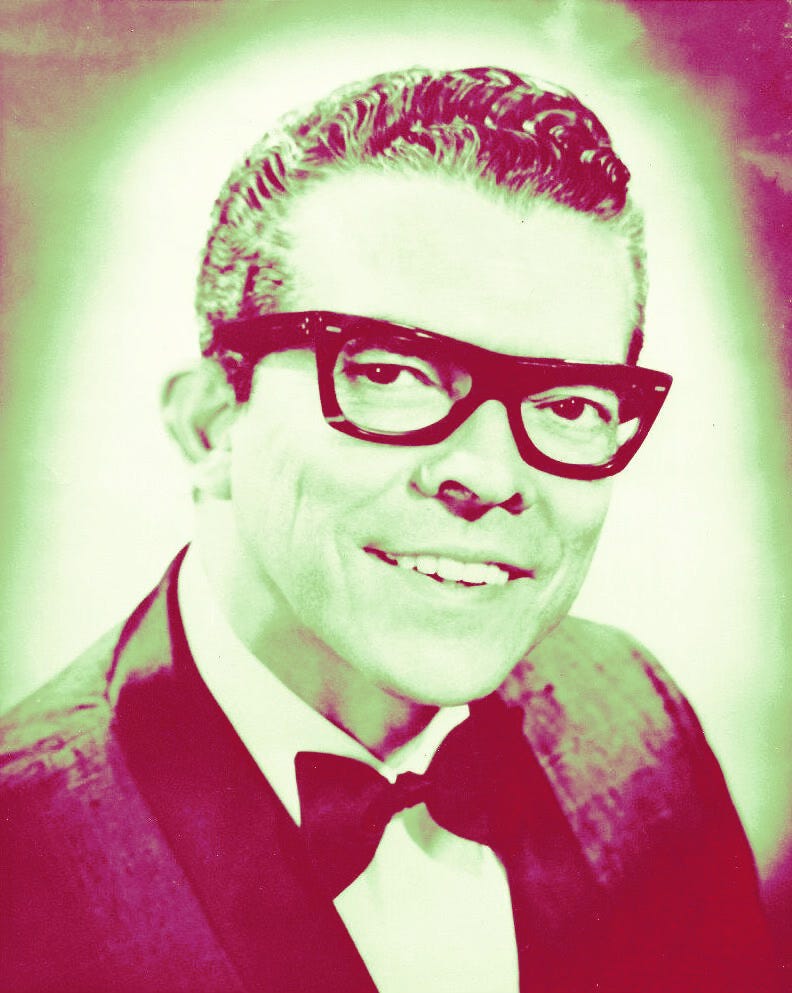Conversations with Esquivel (Part One)
Flashing back on a 1995 interview with the genius of space-age bachelor pad music
The June 1994 release of Space-Age Bachelor Pad Music, a compilation of 1950s and ‘60s recordings by Mexican bandleader Juan García Esquivel, was an absolute revelation for me and so many other listeners with a taste for vintage lounge music.
By then, I’d been slowly feeling my way along the velvet path to easy-listening nirvana for a nearly a decade, a journey that had begun with my discovery of the life-affirming joys of Herb Alpert and the Tijuana Brass LPs, and had gradually expanded to include the works of Astrud Gilberto, Sérgio Mendes and Brasil 66, Martin Denny, Arthur Lyman, The Baja Marimba Band, and the first Bob Crewe Generation album. It was great music to work to — I could play this kind of stuff at the record store without risking the wrath of my rock-averse boss — and in the early ‘90s, when everyone and their mom was suddenly falling over themselves to grab the latest guitar-heavy alt-rock CD, it felt gleefully subversive (and enjoyably perverse) to be grooving gently along to the well-manicured sounds of the three-martini lunch generation.
But while Esquivel’s music — which had been only a rumor to me until the release of that Bar/None comp — was indeed well-manicured and impeccably rendered, there was nothing “easy” at all about it. A self-taught pianist born in Tampico and raised in Mexico City, Esquivel grew up to become a composer, conductor and bandleader who favored wildly whimsical and inventive arrangements filled with exotic instrumentation, nonsensical vocal punctuations and dizzying stereo effects. He began recording for RCA Victor in the late 1950s, just in time to participate in the label’s Living Stereo series of releases that were specifically designed to showcase the heretofore untapped possibilities of stereophonic audio.
But Esquivel albums like 1959’s Exploring New Sounds in Hi-Fi/Stereo and 1962’s Latin-esque (my personal favorite, in which Esquivel took the whole “stereo action” thing even further by simultaneously conducting two orchestras) were no mere stereo demonstration records. His kinetic arrangements breathed new, giddy life into classic standards, and his own compositions (like Latin-esque’s “Mucha Muchacha”) were like otherworldly cartoons projected across your imagination. To this day, I find it impossible to remain in a bad mood when an Esquivel record is playing; it is truly, to quote the title of a second Bar/None compilation of his work, Music From a Sparkling Planet.
By the time that second compilation arrived in late 1995, I was a full-fledged Esquivel fan — so when I learned that the great man would actually be doing interviews to support its release, I jumped at the chance to speak with him. At the time of our phone conversation, the 77 year-old Esquivel had already been confined to bed for a couple of years due to hip and spinal issues (the latter stemming from an injury he’d suffered back in 1961), but his mind was still extremely sharp, and his sense of humor was as playful as ever. “They thought I was crazy,” he laughed, recalling the uptight critical reception to some of his work back in the day…
At this point, he was still talking about making a comeback, though that sadly never happened; his health problems continued to limit his movement, and he died in 2002 after suffering a series of strokes.
The piece that resulted from our interview ran in the L.A. Reader, where I was working at the time as Assistant Music Editor, but the interview itself (the tape of which I recently unearthed) has never been published anywhere until now — and I present it here as a treat for my paid subscribers. I would have the pleasure of interviewing Esquivel again, in late 1999, and I will also share that Q&A here in the not too distant future…
(Oh, and just for the record — while I would have respectfully addressed him as Señor Esquivel, I was informed by his publicist ahead of our call that he preferred to be addressed as Juan.)
Hello, Juan.
Hello, how are you?
Good. How are you feeling today?
Oh, so-so. But I could say that I'm living well.
That’s good to hear. Well, so I wanted to ask you a few questions about your music. When you were writing and arranging and making your records, did you have any idea that future generations would fall in love with it like they have?
No — as a matter of fact, this has been a surprise for me. I’m very happy with the way that the younger generations are receiving my music, and that they appreciate the arrangements. And the only thing that I could say is that I am a little jealous of the attention that they pay to my arrangements, and they don’t mention my piano playing. [laughs] Because in all my music, I do the arrangements and I conduct and I play the piano.



